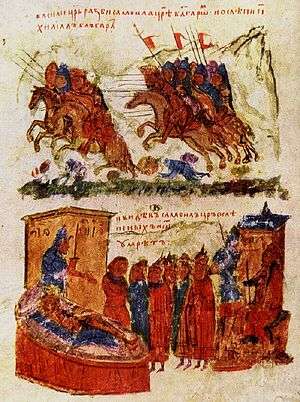1014
| Millennium: | 2nd millennium |
|---|---|
| Centuries: | 10th century · 11th century · 12th century |
| Decades: | 980s · 990s · 1000s · 1010s · 1020s · 1030s · 1040s |
| Years: | 1011 · 1012 · 1013 · 1014 · 1015 · 1016 · 1017 |

The Battle of Kleidon - July 29. The Byzantines under emperor Basil II defeat the Bulgarians (top). Tsar Samuel dying in front of his blinded soldiers (bottom), from the Manasses Chronicle.
| 1014 by topic | |
| Lists of leaders | |
| State leaders | |
| Birth and death categories | |
| Births – Deaths | |
| Establishments and disestablishments categories | |
| Establishments – Disestablishments | |
| Gregorian calendar | 1014 MXIV |
| Ab urbe condita | 1767 |
| Armenian calendar | 463 ԹՎ ՆԿԳ |
| Assyrian calendar | 5764 |
| Bengali calendar | 421 |
| Berber calendar | 1964 |
| English Regnal year | N/A |
| Buddhist calendar | 1558 |
| Burmese calendar | 376 |
| Byzantine calendar | 6522–6523 |
| Chinese calendar | 癸丑年 (Water Ox) 3710 or 3650 — to — 甲寅年 (Wood Tiger) 3711 or 3651 |
| Coptic calendar | 730–731 |
| Discordian calendar | 2180 |
| Ethiopian calendar | 1006–1007 |
| Hebrew calendar | 4774–4775 |
| Hindu calendars | |
| - Vikram Samvat | 1070–1071 |
| - Shaka Samvat | 935–936 |
| - Kali Yuga | 4114–4115 |
| Holocene calendar | 11014 |
| Igbo calendar | 14–15 |
| Iranian calendar | 392–393 |
| Islamic calendar | 404–405 |
| Japanese calendar | Chōwa 3 (長和3年) |
| Javanese calendar | 916–917 |
| Julian calendar | 1014 MXIV |
| Korean calendar | 3347 |
| Minguo calendar | 898 before ROC 民前898年 |
| Nanakshahi calendar | −454 |
| Seleucid era | 1325/1326 AG |
| Thai solar calendar | 1556–1557 |
| Wikimedia Commons has media related to 1014. |
Year 1014 (MXIV) was a common year starting on Friday (link will display the full calendar) of the Julian calendar.
Events
By place
Africa
- Hammad ibn Buluggin recognises the Abbasid Caliphate, beginning the split of the Hammadids from the Zirids.
Asia
- In Kashmir, Abhinavagupta, the teacher of the poet Ksemendra, circulates his Greater commentary on the Pratyabhijna Darshana.
Europe
- February 3 – Sweyn Forkbeard, Danish King of all England since December 25 last, dies at Gainsborough, Lincolnshire, and his son Cnut is proclaimed King of England by the Vikings.[1]
- February 14 – Pope Benedict VIII recognizes and crowns Henry of Bavaria (who has ruled since 1003) as King of Germany.
- March – Æthelred the Unready returns from exile in Normandy to reclaim the throne of England at the invitation of English nobles.[2]
- April – Cnut returns to Denmark to enforce his rule there.
- April 23 – Battle of Clontarf: Gaelic Irish forces under Brian Boru defeat several allied Viking forces in Ireland. However, Brian is killed in the battle.
- July – Battle of Thessalonica fought in Greece: forces of the Byzantine Empire under Theophylact Botaneiates defeat those of the First Bulgarian Empire.
- July 29 – Battle of Kleidion: Basil II, leading forces of the Byzantine Empire, inflicts not only a decisive defeat on the Bulgarian army, but his subsequent blinding of 15,000 prisoners reportedly causes Tsar Samuil of Bulgaria to die of shock, and earns Basil II the sobriquet Boulgaroktonos ("Bulgar-slayer").
- Holmgang is declared illegal in Norway.
By topic
Religion
- The Nicene-Constantinopolitan Symbol of the Faith is used for the first time during the Roman Mass after Henry II, the newly crowned Holy Roman Emperor, asks the Pope to add it together with the filioque clause. Prior to this date, the Creed has not been used at all during the liturgy.
- In England, Wulfstan II, Archbishop of York preaches his Latin homily Sermo Lupi ad Anglos ("Wulf's Address to the English"), describing the Danes as "God's judgement on England".[3]
Births
- Al-Bakri, Andalusian Muslim geographer and historian (d. 1094)
- Princess Constance, daughter of Robert II of France (d. 1052)
Deaths
- February 3 – Sweyn I Haraldsson Forkbeard, king of Denmark
- April 23 – Brian Boru, high king of Ireland
- June 25 – Æthelstan Ætheling, eldest son of Æthelred the Unready
- August – Theophylact Botaneiates, Byzantine general and governor of Thessalonica
- October 6 – Tsar Samuil of Bulgaria
- Sigurd the Stout, Viking earl in Orkney
- King Raja Raja Chola I, of the Chola Empire of southern India and great temple builder of the Chola dynasty
References
Sources
- Needham, Mark (2008). "Æthelred (II The Unready, King of the English 978-1013, 1014-1016)". Archived from the original on November 19, 2014. Retrieved 4 January 2008.
- Palmer, Alan; Palmer, Veronica (1992). Chronology of British History. London: Century Ltd / Barrie & Jenkins. pp. 48–49. ISBN 978-0712656160.
- Williams, Hywel (2005). Cassell's Chronology of World History. Weidenfeld & Nicolson. pp. 105–106. ISBN 978-0304357307.
This article is issued from Wikipedia - version of the 9/8/2016. The text is available under the Creative Commons Attribution/Share Alike but additional terms may apply for the media files.